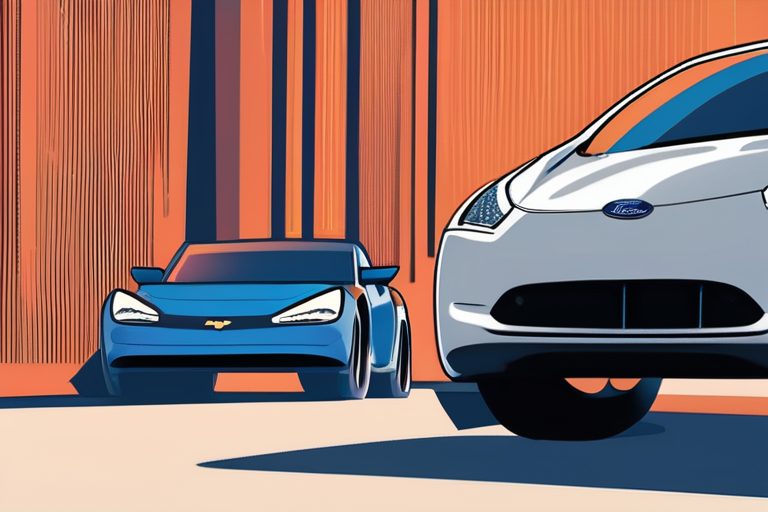Exclusive: Trump's DOE Proposes Cutting Billions in Grants for GM, Ford, and Startups - A Blow to the Future of Electric Vehicles
As the sun rises over the sprawling General Motors (GM) Lansing Grand River Assembly Plant in Michigan, a sense of uncertainty hangs in the air. The plant, once a symbol of American automotive ingenuity, is on the cusp of a major transformation. With plans to produce electrified vehicles, including hybrids, GM had secured a significant grant from the federal government to retool the facility. But now, the Trump administration's proposal to cut billions in grants has thrown the future of this project - and many others like it - into jeopardy.
According to an internal document obtained by TechCrunch, the Department of Energy (DOE) is looking to cancel more than $500 million in contracts awarded to over a dozen startups. This move comes on top of the administration's previous announcement to cut over $7.5 billion in contracts last week. The proposed cancellations are grants that were awarded under the Bipartisan Infrastructure Law, aimed at supporting innovative technologies and industries.
The affected companies include not just startups but also established automakers like Ford, General Motors, Stellantis, Daimler Trucks North America, Harley-Davidson, Mercedes-Benz Vans, and Volvo Technology of America. These companies had been counting on the federal funding to support their transition to electric vehicles (EVs) and other emerging technologies.
For GM, the proposed cut would be a devastating blow. The company had planned to use the grant money to retool its Lansing plant, investing in new equipment and technology to produce EVs. This move was seen as a crucial step towards reducing emissions and meeting the growing demand for sustainable transportation options.
But what does this mean for the future of electric vehicles? And how will these proposed cuts impact the companies and startups affected?
A Glimpse into the World of Electric Vehicles
Electric vehicles are no longer just a novelty; they're becoming an essential part of our transportation landscape. With governments around the world setting ambitious targets to reduce emissions, EVs have become a critical component in the transition to cleaner energy.
Companies like GM and Ford are investing heavily in EV technology, with plans to produce millions of units over the next decade. But this requires significant investment in new manufacturing facilities, equipment, and research and development.
The federal grants were designed to support these efforts, providing crucial funding for companies to retool their plants and invest in emerging technologies. By cutting these grants, the administration is essentially pulling the rug from under the feet of these companies.
A Human Interest Story
For entrepreneurs like Rachel Kim, founder of startup EV Innovations, the proposed cuts are a personal blow. Her company had secured a grant to develop advanced battery technology for EVs. The funding was crucial in helping her team overcome significant technical hurdles and bring their innovative solution to market.
"We were counting on this funding to take our product to the next level," Kim explained in an interview with TechCrunch. "If these grants are cut, it will be devastating for us and many other startups like ours."
Multiple Perspectives
While some critics argue that the proposed cuts are necessary to reduce government spending, others see them as a short-sighted move that will ultimately harm the economy.
"Cutting funding for EVs and emerging technologies is a recipe for disaster," said Dr. Emily Chen, an expert in energy policy at the University of California. "These companies are creating jobs, driving innovation, and reducing emissions. By cutting their funding, we're essentially stifling progress."
Conclusion
The proposed cuts to federal grants for GM, Ford, and startups like EV Innovations have sent shockwaves through the industry. As the world transitions to cleaner energy sources, it's clear that electric vehicles will play a critical role.
But with the administration's proposal to cut billions in funding, it's unclear whether these companies will be able to continue their progress. The future of electric vehicles hangs in the balance, and the consequences of this decision will be far-reaching.
As the sun sets over the GM plant in Michigan, one thing is clear: the fate of America's automotive industry - and its commitment to a sustainable future - rests on the shoulders of policymakers in Washington.
*Based on reporting by Techcrunch.*



 Hoppi
Hoppi

 Hoppi
Hoppi

 Hoppi
Hoppi

 Hoppi
Hoppi

 Hoppi
Hoppi

 Hoppi
Hoppi











